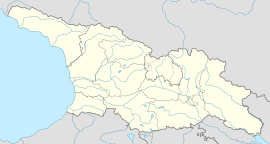Tkibuli
ტყიბული | |
|---|---|
 Tkibuli city centre | |
| Coordinates: 42°21′01″N 42°59′54″E / 42.35028°N 42.99833°E | |
| Country | Georgia |
| Region (Mkhare) | Imereti |
| Municipality | Tkibuli Municipality |
| Population (January 1, 2024)[1] | |
| • Total | 8,130 |
| Time zone | UTC+4 (Georgian Time) |
| Area code | (+995) |
| Climate | Cfa |
| Website | tkibuli |
Tkibuli or Tqibuli (Georgian: ტყიბული) is a town in west-central Georgia of 8,130 residents (January 2024). located in the Imereti region at the foot of the Racha Range and the Nakerala limestone cliff, which marks the boundary of the historic region Racha. Tkibuli gained city status in 1939,[2] and has been a coal mining center since mining started in 1846. The city is also known for the tea that is grown in the region and sold throughout the country. It is located between two man-made reservoirs used for hydropower generation with an elevation difference of more than 600 metres (2,000 ft).
At the height of mining in the Soviet-era Tkibuli had more than 20,000 residents,[3] but the economic disarray of the 1990s caused an exodus from the city and the mines practically halted production. Since production has resumed in 2008 by a Georgian company, the mines are a mainstay of local economy providing 2,000 people and their families the only source of income. However, the mines have become notorious for fatal accidents due to outdated equipment and inappropriate safety standards.[4] After a series of fatal accidents, claiming 16 lives in total in 2018,[5] mining was put on hold in late 2018 but resumed again in 2019.[6]
- ^ "Population by regions". National Statistics Office of Georgia. Retrieved 28 April 2024.
- ^ "Definition of "Tkibuli"". Great Soviet Encyclopedia, 3rd edition 1969–1978 (in Russian). Retrieved 26 August 2022.
- ^ "Population cities & towns of Georgia". Population Statistics Eastern Europe and former USSR. Retrieved 26 August 2022.
- ^ "Georgian coal town longs for Chinese rescue | Eurasianet".
- ^ "Georgia 2018: Top 10 events of the year". JamNews. 28 December 2018. Retrieved 6 January 2019.
- ^ "Coal Mining to Resume in Tkibuli". Civil Georgia. 27 July 2019. Retrieved 26 August 2022.



